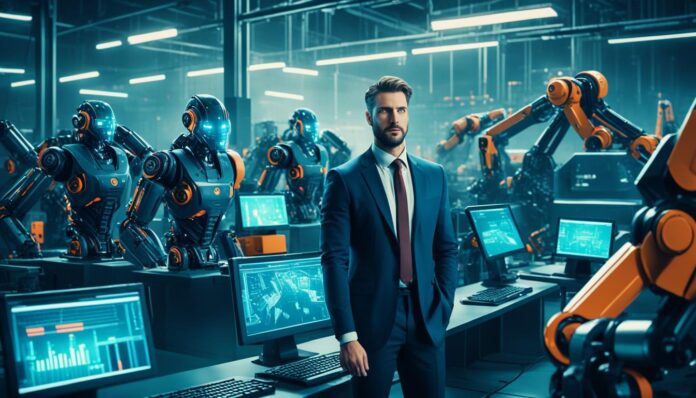
As the world inches closer to the year 2025, the conversation surrounding the potential impacts of AI on various industries has gained significant momentum. Experts are divided on whether AI and robotics will create more jobs than they displace, but one thing is certain – the transformation will be profound.
According to industry reports, the AI disruption and AI automation are expected to revolutionize the way we work, with AI-powered workforce and AI transformation becoming the new norm. By 2025, AI integration and AI adoption are projected to reach unprecedented levels, as businesses make substantial AI-related investments to capitalize on the AI innovations and AI-driven efficiencies that will reshape AI-enabled industries.
While some experts envision a future where robots and AI have displaced significant numbers of both blue-collar and white-collar workers, leading to concerns over income inequality and social disruption, others believe that technology will continue to create more jobs than it destroys, as it has historically. Regardless of the outcome, one thing is clear: the world is on the cusp of a transformative shift, and your organization’s ability to navigate this landscape will be crucial to its long-term success.
Key Takeaways
- Experts are divided on the impact of AI and robotics on the job market by 2025, with some anticipating significant job displacement and others believing technology will create more jobs than it destroys.
- AI is expected to have a transformative impact on key industries like healthcare, retail, finance, and manufacturing, driving efficiency, personalization, and productivity.
- Global AI-related investment could reach $200 billion by 2025, as businesses invest in new technologies to boost labor productivity and gain a competitive edge.
- Challenges such as data privacy, algorithmic bias, and job displacement will need to be addressed as AI continues to evolve and integrate into various industries.
- Navigating the changing landscape of AI-enabled industries will be crucial for organizations to remain competitive and successful in the years ahead.
The Rise of Automation and AI
As the world rapidly embraces AI disruption and AI automation, the implications for both blue-collar and white-collar jobs are becoming increasingly evident. Experts are deeply divided on the potential impact of AI-powered technologies on the job market by 2025, with some anticipating significant workforce displacement and others believing that human ingenuity will continue to create new types of work.
Advances in AI and Robotics
Networked, automated AI applications and sophisticated robotic devices are poised to transform a wide range of industries. From manufacturing to healthcare, these AI innovations are expected to drive AI-driven efficiencies and boost productivity, leading to concerns over the AI-powered workforce and its potential impact on the job market.
Implications for Blue and White-Collar Jobs
The AI transformation underway is raising critical questions about the future of work and its impact on both blue-collar and white-collar professions. While some experts foresee significant job displacement, others believe that technology will continue to create more jobs than it destroys, as it has historically. Nonetheless, the need to prepare our educational system and economic institutions for the AI-enabled industries of tomorrow remains a pressing concern.
Concerns over Job Displacement and Income Inequality
As AI automation and AI disruption continue to reshape the job market, there are growing concerns over the potential for widespread job displacement and the widening of income inequality. This has led to calls for policymakers and businesses to proactively address these challenges and ensure that the benefits of AI innovations are equitably distributed across society.
AI Transforming Key Industries
As AI continues to evolve and integrate into various sectors, its transformative impact on key industries by 2025 is becoming increasingly evident. The second source highlights how this advanced technology will reshape healthcare, retail, and finance, driving significant improvements in efficiency, personalization, and overall performance.
AI in Healthcare: Diagnostics, Drug Discovery, and Telemedicine
In the healthcare industry, AI-driven diagnostics and treatment recommendations will significantly improve patient outcomes and reduce costs. Predictive analytics and machine learning will assist in early disease detection, while AI-powered robots and chatbots will enhance patient engagement and streamline administrative tasks. These AI-enabled advancements will revolutionize the way healthcare is delivered, making it more accessible, efficient, and personalized.
AI in Retail: Personalization, Smart Stores, and Supply Chain Optimization
Within the retail sector, AI will enhance the customer experience through personalized recommendations, smart stores, and optimized supply chains. Chatbots and virtual assistants will improve customer service, and AI-driven marketing strategies will deliver more precise, data-driven insights. These AI-powered innovations will enable retailers to better understand and cater to their customers’ needs, ultimately driving increased sales and loyalty.
AI in Finance: Investment Strategies, Fraud Detection, and Credit Assessment
In the finance industry, AI-driven algorithms will transform investment strategies, fraud detection, and credit assessment. AI-based compliance and customer service will also improve the overall banking experience. By harnessing the power of AI, financial institutions will be able to make more informed decisions, detect fraudulent activities more effectively, and provide a more personalized and efficient service to their clients.

What are the potential impacts of AI on industries in 2025?
AI in Manufacturing: Automation, Customization, and Predictive Maintenance
The manufacturing sector is poised to experience a significant transformation with the integration of AI in manufacturing by 2025. According to the second source, AI-driven automation will redefine the manufacturing process, with robotic systems performing repetitive and dangerous tasks, leading to increased efficiency and safety. Predictive maintenance, enabled by AI innovations, will help reduce downtime and cut costs, while AI will also facilitate the customization of products at scale. Supply chains will become more resilient through better demand forecasting, and logistics will be optimized, reducing waste and environmental impact.
Challenges and Considerations: Data Privacy, Algorithmic Bias, and Job Displacement
However, as the first source mentions, there are also concerns and challenges that must be addressed as the AI transformation and AI integration in industries accelerate. Issues related to data privacy, algorithmic bias, and job displacement will need to be carefully navigated. Regulations and ethical guidelines will need to evolve in tandem with the AI adoption and AI-driven efficiencies to ensure these technologies benefit society as a whole and the AI-powered workforce is supported during this period of AI disruption.
Conclusion
The potential impacts of AI on industries by 2025 are both transformative and complex. While experts may be divided on the net effect on jobs, the data suggests that AI-driven advancements will significantly reshape key sectors like healthcare, retail, finance, and manufacturing. Improved diagnostics, personalized experiences, optimized processes, and increased automation are just some of the ways AI will drive efficiencies and innovation.
However, these changes also raise concerns over data privacy, algorithmic bias, and job displacement that will need to be carefully navigated. Ultimately, the future of AI in 2025 and beyond will depend on how businesses, policymakers, and society at large adapt to and harness the power of this transformative technology.
By addressing the challenges and embracing the opportunities, you can shape a future where AI-enabled industries benefit both the economy and the wellbeing of all. The integration of AI across various sectors holds immense potential, but it will require a thoughtful and responsible approach to ensure the technology serves the greater good. Stay vigilant, stay informed, and be a part of shaping the AI-powered future that lies ahead.
FAQ
What is the outlook on the impact of AI and robotics on the job market by 2025?
According to the first source, there is a deep divide among experts on whether AI and robotics will displace more jobs than they create by 2025. Around half of the experts surveyed envision a future where robots and AI have displaced significant numbers of both blue-collar and white-collar workers, leading to concerns over income inequality and social disruption. The other half believe that technology will continue to create more jobs than it destroys, as it has historically.
How will AI transform key industries by 2025?
The second source highlights the transformative potential of AI across key industries like healthcare, retail, finance, and manufacturing by 2025. AI-driven advancements are expected to improve efficiency, personalization, and productivity in these sectors.
What is the projected growth of AI-related investment by 2025?
The third source suggests that AI-related investment could reach 0 billion globally by 2025, as businesses make significant upfront investments to acquire and implement new technologies, which could eventually boost global labor productivity by over 1 percentage point per year.
What are the potential impacts of AI on the manufacturing sector by 2025?
The second source highlights the potential impact of AI on the manufacturing sector by 2025. AI-driven automation will redefine the manufacturing process, with robotic systems performing repetitive and dangerous tasks, leading to increased efficiency and safety. Predictive maintenance will help reduce downtime and cut costs, while AI will also facilitate the customization of products at scale.
What are the challenges and considerations surrounding the growth of AI in industries?
The second source mentions that while AI-driven advancements will significantly reshape key sectors, these changes also raise concerns over data privacy, algorithmic bias, and job displacement that will need to be carefully navigated. Regulations and ethical guidelines will need to evolve in tandem with AI’s growth to ensure these technologies benefit society as a whole.
